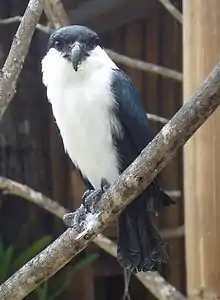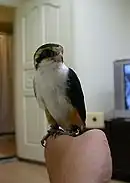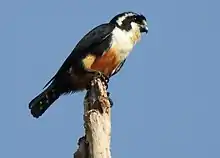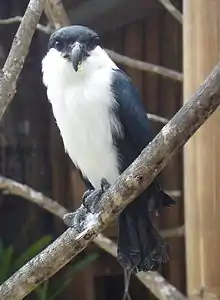| Microhierax | |
|---|---|
 | |
| Philippine falconet (Microhierax erythrogenys) | |
| Scientific classification | |
| Domain: | Eukaryota |
| Kingdom: | Animalia |
| Phylum: | Chordata |
| Class: | Aves |
| Order: | Falconiformes |
| Family: | Falconidae |
| Subfamily: | Falconinae |
| Genus: | Microhierax Sharpe, 1874 |
| Type species | |
| Falco fringillarius[1] Drapiez, 1824 | |
| Species | |
The typical falconets, Microhierax, are a bird of prey genus in the family Falconidae. They are found in southeast Asia and the smallest members of Falconiformes, averaging about 15 cm (5.9 in) in length and 35 g (1.2 oz) in weight. The smallest members of the genus are the relatively widespread black-thighed falconet, and the white-fronted falconet on the island of Borneo.
Taxonomy and systematics
The first description by a European ornithologist of a falconet from this group was published by George Edwards in 1750, as "the little black and orange colour'd Indian hawk". It was from a specimen that had been collected in Bengal and sent to the King's physician, Dr Mead.[2] In 1758 Carl Linnaeus used the illustration and description by Edwards to formally describe the species under the binomial name Falco cærulescens[3][4] In 1760 the French naturalist Mathurin Jacques Brisson also used Edwards' publication to describe le Faucon de Bengale.[5][6] Although the white collar was not mentioned, the English ornithologist Richard Bowdler Sharpe believed that this was the same species that we now call the collared falconet.[5]
In 1824, Vigors proposed a new genus Ierax, writing "whoever has seen that beautiful species, the smallest of its race, F. cærulescens, Linn., now rendered familiar to us by the accurate and splendid illustrations of Dr. Horsfield, will at once acknowledge its separation from every other established genus of its family."[7]: 328 Later authors rendered the name Hierax.
Sharpe coined the name Microhierax in 1874, from the Greek μικρός ἱεραξ meaning "tiny hawk".[5] By this time, four species were known: M. cærulescens, M. fringillarius, M. melanoleucos, and M. erythrogenys. He lists Horsfield's specimen "Falco cærulescens" as being actually M. fringillarius, making the latter the type of the genus.
A fifth species, the white-fronted falconet M. latifrons, was described by Sharpe in 1879.[8][9]
Extant Species
| Image | Scientific name | Common Name | Distribution |
|---|---|---|---|
 | Microhierax caerulescens | Collared falconet
Red legged falconet |
Bangladesh, Bhutan, Cambodia, India, Laos, Myanmar, Nepal, Thailand, Malaysia, and Vietnam. |
 | Microhierax fringillarius | Black-thighed falconet | Brunei Darussalam, Myanmar, Thailand, Malaysia, Singapore and Indonesia. and vagrant to Sri Lanka |
.jpg.webp) | Microhierax latifrons | White-fronted falconet | Sabah on the island of Borneo |
 | Microhierax erythrogenys | Philippine falconet | Philippines |
_from_pakke_tiger_reserve_JEG3641_(cropped).jpg.webp) | Microhierax melanoleucos | Pied falconet | Bangladesh, Bhutan, China, Hong Kong, India, Laos, and Vietnam. |
References
- ↑ "Falconidae". aviansystematics.org. The Trust for Avian Systematics. Retrieved 2023-07-25.
- ↑ Edwards, George (1750). "The little Black and Orange colour'd Indian Hawk". A Natural History of (Uncommon) Birds. Vol. Part 3. London. Plate 108.
- ↑ Linnaeus, C. (1758). Systema Naturæ per regna tria naturae, secundum classes, ordines, genera, species, cum characteribus, differentiis, synonymis, locis, Volume 1 (in Latin). Vol. 1 (10th ed.). Holmiae:Laurentii Salvii. p. 88.
- ↑ Mayr, Ernst; Cottrell, G. William, eds. (1979). Check-list of Birds of the World. Volume 1. Vol. 1 (2nd ed.). Cambridge, Massachusetts: Museum of Comparative Zoology. p. 399.
- 1 2 3 Sharpe, R. Bowdler (1874). "Microhierax". Volume I: Catalogue of the Accipitres or Diurnal Birds of Prey in the Collection of the British Museum. Catalogue of the Birds in the British Museum. Vol. 1. London: Trustees of the British Museum. pp. 366–369.
- ↑ Brisson, Mathurin Jacques (1760). Ornithologie, ou, Méthode contenant la division des oiseaux en ordres, sections, genres, especes & leurs variétés: Supplement d'Ornithologie. Vol. 6. Paris: Jean-Baptiste Bauche. p. 20.
- ↑ Vigors, Nicholas Aylward (June 1824). "On the groups of the Falconidæ". Sketches in Ornithology. The Zoological Journal. 1 (2): 308–346.
- ↑ Peterson, Alan P. (2015-07-17). "Birds of the World -- current valid scientific avian names, version 10.008". Zoonomen. Retrieved 23 March 2016.
- ↑ Page 237 and plate 7 in Sharpe, R. Bowdler (July 1879). "On the Birds of the Province of Lumbidan, North-western Borneo". Contributions to the Ornithology of Borneo. The Ibis. 4. 3 (11): 233–272. doi:10.1111/j.1474-919X.1891.tb08523.x.
External links
- A. Pelletier (illustrator), C. [Charles Joseph] Hullmandel (lithographer) 1822. Illustration of Falco cærulescens from Java [later Microhierax fringillarius] BHL (Smithsonian) BHL(Singapore). Plate 35 in Horsfield, Thomas (1824). Zoological researches in Java, and the neighbouring islands. London: Kingsbury, Parbury, & Allen. doi:10.5962/bhl.title.44848.
- Section Falco cærulescens, page 135 IA BHL in Horsfield, Thomas (1822). "Systematic arrangement and description of birds from the island of Java. Read April 18, 1820". Transactions of the Linnean Society of London. 13: 135–200. "The drawing of Edwards was made from a bird sent from Bengal. The Javan specimens are somewhat smaller, and differently marked. They appear to form a distinct variety..."